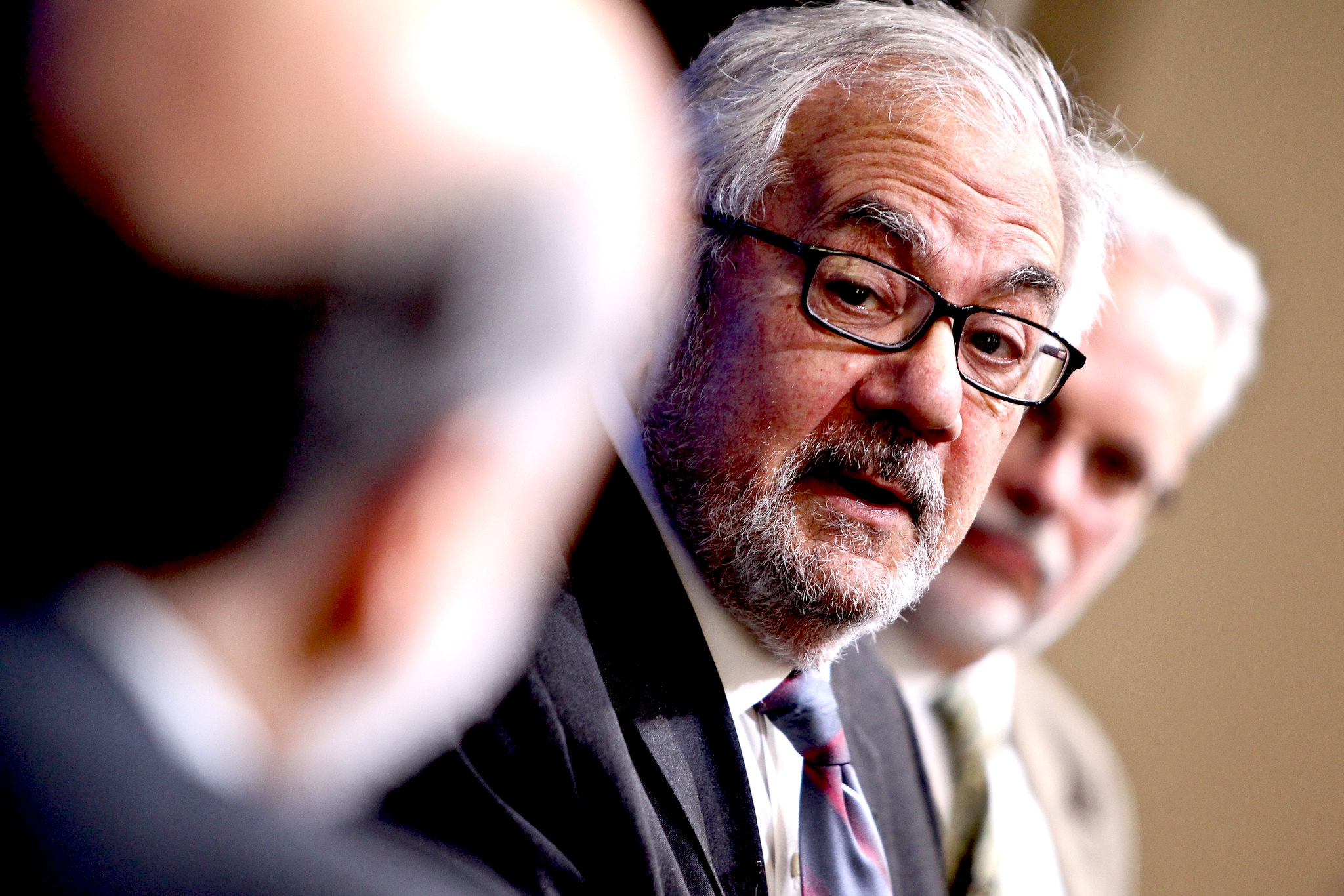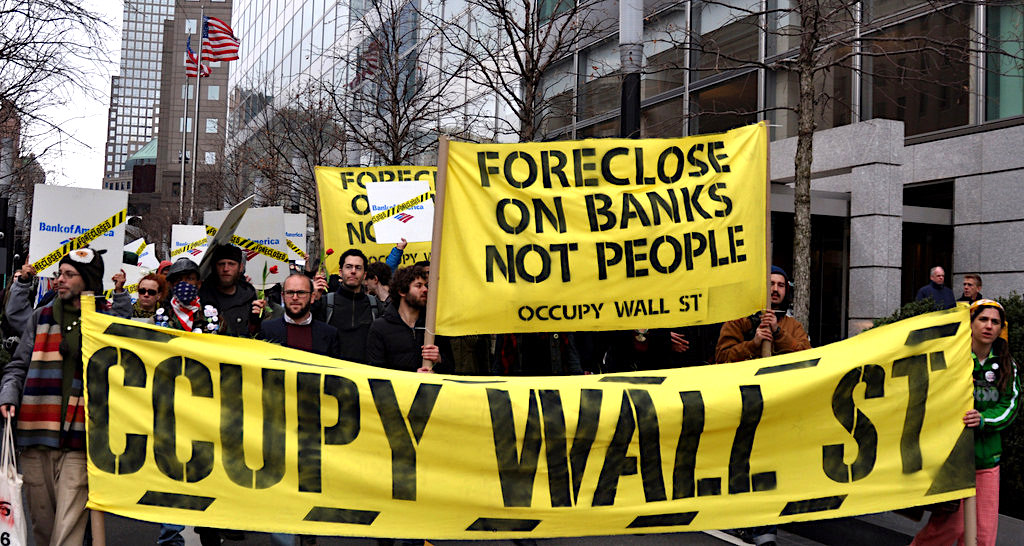The collapse and bailout of Silicon Valley Bank shows little has changed for reckless financial actors, writes Les Leopold. If financial institutions are so interconnected that we can’t let them fail, they should be run as publicly owned utilities.

Silicon Valley Bank offices in Tempe, Arizona, 2020. (Tony Webster, Flickr, CC BY 2.0)
By Les Leopold
Common Dreams
 In case we need any more proof, the bailout of the Silicon Valley Bank (SVB) is yet another overt sign that we are operating within a new version of capitalism. The wealthiest among us have little fear of losing money from their most important financial investments. They know they will be bailed out and the rest of us will pick up the tab.
In case we need any more proof, the bailout of the Silicon Valley Bank (SVB) is yet another overt sign that we are operating within a new version of capitalism. The wealthiest among us have little fear of losing money from their most important financial investments. They know they will be bailed out and the rest of us will pick up the tab.
The crisis at SVB has made a mockery of bank deposit insurance and private banking. In the U.S., bank deposits are insured up to $250,000. If the bank fails, those with accounts below that amount are fully protected. But deposits over that amount are not.
The reason is straightforward. If you insure all accounts, no matter their size, bank executives will have every incentive to maximise their profits by investing depositor money in the riskiest, highest-yielding investments they can find.
If they succeed, the bank officers and investors become rich. If they fail, the government makes the depositors whole. It’s a business model with little downside.
This logic has been understood since the first bank insurance was debated and put in place during the 1930s. (President Franklin Roosevelt worried that bank insurance would unfairly subsidise poorly run banks.) So why is this rule being breached now?
The reasons given are many. Small businesses with sums in SVB above $250,000 won’t be able to make payroll. Workers will be laid off. Cutting-edge high-tech enterprises will fail. People will lose confidence and cause bank runs. The entire financial system, it is implied, is so interconnected that a failure of one bank may take down many others, and so on.
But perhaps the major reason in the case of SVB’s bailout has to do with the very wealthy venture capitalists who are invested in many of the tech start-ups that have their money parked in SVB accounts. These VC moguls, many of whom profess to be anti-government libertarians, made it clear to the political establishment that a bailout was required — and immediately!
This time, they didn’t care about bailing out the investors or bank officers. Those days are over. The big money was wrapped up in more than $200 billion in uninsured deposits. Their argument was simple — we are just too important to America for it to allow our operations to suffer financially. We are the backbone of high tech, of innovation, of American economic leadership. (And we put a lot of money into your political campaigns.)
Gutting Regulation
SVB’s failure — and the failure of New York-based Signature Bank that followed — will lead to much hand-wringing about the need to tighten regulations, which were weakened in 2018 during the Trump administration.
SVB lobbied successfully to avoid facing the same regulations as the “systemically important” mega-banks. They wriggled out of some of the strongest provisions of the Dodd-Frank banking legislation, as the bank assets threshold [for those banks affected by the provisions] was increased from $50 billion to $250 billion. (Barney Frank, the Frank in Dodd-Frank, incredibly, supported the weakening of his own bill. He sits on the board of the failed Signature Bank, having received more than $2.4 million in cash and stock awards over the past seven years.)

Former Congressman Barney Frank, D-MA, in 2015. (Brookings Institution/Flickr, CC BY-NC-ND 2.0)
While the need for tighter regulations will dominate the discussion, we are missing the bigger picture. The financial barons and their CEO partners have a stranglehold over our economy: They are too big to fail and too politically important to suffer any appreciable financial harm. We will always bail them out, or the economy will crash, harming millions of working people.
It wasn’t always like this.
After the Great Depression, banking in the U.S. was tightly regulated. One measure of this government control shows up in the income received by bankers. Between WWII and 1980 or so, there was virtually no difference in income between financial and manufacturing professionals.
Reagan-Thatcher Era
That changed in a hurry after the Reagan-Thatcher idea of government captured the minds of most policymakers. The goal was to get the government out of the economy and get its foot off the necks of Wall Street/City financiers. Let them be free to create, free to build, free to drive the economy forward. Let them fund mergers and hostile takeovers that weed out the weak. Let them use corporate money to buy back stocks, manipulate share prices and stuff their own pockets. Let them become rich and richer as they lead us to a brighter, better world.
Once deregulation started, money flowed to the top. In the U.S., the gap between the top 100 CEOs and an average worker was about 40-to-1 in 1980. Today it is closer to 1000-to-1. And as the money flowed upwards, more deregulation followed.
Both political parties tripped over themselves to compete for Wall Street cash. The Democrats, under Bill Clinton, broke through Glass Steagall — the wall created during the New Deal that separated risky investment banking from the insurance industry and commercial banking.
And they deregulated derivatives that allowed for financial betting involving tens of trillions of dollars. It was argued that these bets would stabilise the financial system by spreading risk far and wide.
Instead, it brought the system to its knees. The entire financial system froze in 2008, causing 6 million American workers to lose their jobs in a matter of months due to no fault of their own.

Wall Street, March 2012. (Michael Fleshman)
The government responded by bailing out those banks and basically guaranteeing their profits. It allowed the failed banking executives to stay in control and none of the financial criminals were prosecuted. This announced to all who cared to notice that we had entered a phase of capitalism we could call the Billionaire Bailout Society.
To be sure, new regulations had to be passed to appease a furious public. Dodd-Frank forced the large banks to keep more cash on hand and to go through periodic stress tests. But should a crisis reach those banks, does anyone really believe they will be allowed to fail?
The question to ask right now must go beyond how to re-regulate massive for-profit private banks. The real question is, what will it take to disband the Billionaire Bailout Society?
The SVB event tells us that any bank that is well-connected or simply large enough to cause financial chaos will have its depositors bailed out — all of them. But then, how are such banks free enterprises?
The next step should be obvious. Our only realistic path away from having to bail them out over and over again is to nationalise large parts of the banking system. If these financial institutions are so interconnected that we can’t let them fail, they should be run as publicly owned utilities.
Les Leopold is the director of the Labor Institute in New York — working with unions, worker centers, and community organizations to build a national economics educational campaign. He is the author of How to Make a Million Dollars an Hour: Why Hedge Funds Get Away with Siphoning Off America’s Wealth (2013).
This article is from Common Dreams.
The views expressed in this article and may or may not reflect those of Consortium News.

Looking at the trajectory of rabid Western and pro-Western capitalism and its unchecked anti-human abuses one is forced to conclude that the world is headed to herald in Trillionaires’ BAILOUT soceities in the not too distant future that ride on the back of a globalist “privatise-to-pocket-the-universe-for-oligarchic-screwing” agenda securely facilitated by their mercenary bureaucratic lapdogs in governments. Thank God China, to some point Russia and the consistent Global South are breaking ranks and pursuing different paths towards salvaging humanity including via the evolving multi-polarity. India, of course, remains the hesitant black sheep that tries to benefit from flirting with every side !
I don’t buy the anecdotal MSM comment about payroll. Payroll leaves the bank when it’s disbursed. Payroll exists to be disbursed. SVB was simply not ready for big disbursals. Period. Why were there big disbursals, who had a short position? who knew about vulnerabilities and exploited them? These questions need proper answers, not the standard American MSM sweeping under the rug.
Excellent article. I fully agree.
We must also keep in mind that the current banking system is owned and controlled by criminals. The history and mechanism of this explained in the article on banking here.
War Profiteer Story
hXXps://war**profiteer**story.blogspot.com
[To use link delete asterisks and replace XX with TT.]
With their immense ill-gotten gains they have captured the corporate press and politicians. As Dick Durban said about the US Senate, “The banks own the place.” So rooting them out will not be easy. But the more the public learns, the weaker their grip becomes. This is a teachable moment.
I agree, but we the people must organize in the way Ralph Nader suggested in Breaking Through Power.
spot on. Imagine the illicit Pentagon funds, accrued from years of overbilling a corrupt and complicit congress, socked away with Wall Street. Imagine the people who live off the vigorish on those funds! It explains a lot of American culture, politics, business (the emphasis on elevation of a few hegemonic businessmen monopolists and oligarchs over a truly competitive open capitalism). You are spot on. I will enjoy reading your link.
In this era, we probably need to realize that nationalizing an industry is not synonymous with running it as a public utility. Nationalization is public only insofar as national government is legitimately democratic and representative. In the United States, there is currently no statistically significant correspondence between national policy and the population. A nationalized finance system will therefore not function as a public utility any more than does, say, the Fed or the IMF or the World Bank.
The federal government is the arm most extensively engaged in wars and related abuse. It is the most subject to abuse by the 3-letter spooks, who have no effective public oversight and only occasional flashes of accidental transparency–at best.
What might work better and would likely be easier to accomplish would be private, state, or county non-profits organized more along the lines of credit unions.
High time to bailout all student loan debtors who make less than $120K per year, bail out their entire SL debt. No one should have to live a life of debt bondage for doing what’s been ingrained in them since they were 5 years old: further your education and better yourself no matter what. If the rich kids don’t have to live under massive SL debt, no one else should either.
If we can bail out wealthy depositors and businesses, we can bail out the tens of millions of SL debtors suffering under mountains of debt.
When “leaders” like Biden and his predecessors find socialism to be a dirty word, how can the people in the USA have any human rights at all? All depends on money, and the few who accumulate it and use it for their own ends.
He’s right, regulation is needed but only addresses the symptoms. The entire banking and monetary-system ought to be made a public-service utility, but will never be allowed to happen in our lifetime (I want to be wrong about that) as long as the special group of financial parasites hold so much sway in society.
I second that. Cheers!
“The question to ask right now must go beyond how to re-regulate massive for-profit private banks. The real question is, what will it take to disband the Billionaire Bailout Society?” “Our only realistic path away from having to bail them out over and over again is to nationalise large parts of the banking system. If these financial institutions are so interconnected that we can’t let them fail, they should be run as publicly owned utilities.”
We – us, regular people who are covering the asses of the billionaire fraternity when they shoot us the 3rd finger coming and going- must require of each progressive candidate for state and federal office a pledge to move us – relentlessly – toward nationalizing “large parts of the banking system.” Their having our cake and eating it too must stop.
I get that the “too big to fail” mojo worked stupendously well for the big boys (you know the ones who pull those kind of pants on everyday) back in ought-eight and so why not repeat for the medium sized billy goats gruff & their “VC moguls”. BTW, those weren’t pitchforks you think you saved the high muckety-mucks from, Bomo, they were tiki torches.
As for big pic of the litter viewpoint, I find Rob Urie’s compelling. It’s at his substack page (The Journal of Belligerent Pontification) and he just plunges right in, “This is Fascism, SVB Bailout Edition”. I realize that word rubs all kinds of people all kinds of the wrong way but c’est la vie. He defines how he means it. Here is the nut graph, for me anyway.
“Political architecture where a small group of politicians, oligarchs, and corporate executives erase the lines between corporate and state interests to use state resources for their own benefit while treating the populace as rubes and marks deserving of being preyed upon 1) reasonably well describes the US at present and 2) fits the definition of Italian fascism as state corporatism. Add in unhinged militarism motivated by imperialist objectives and ‘liberal democracy’ looks and feels like fascism to those on its receiving end.”
Yes it’s on Counterpunch too but don’t get the vapors. Or if you insist on it, here are some soundtrack suggestions to soothe your weary soul on this fine St. Paddy’s day (where a winter storm blows outside my window):
Dino, of Rat Pack fame, croons the Wall St. theme song, “Tiny Bubbles”. This one’s dedicated to Barney Frank who I imagine slightly rumpled in sweats, puffing a stogie, feet propped up, sipping pink champagne.
And to Barry I dedicate a song that encapsulates his message to ordinary working people, “(Shut Your Mouth, Go Away) Mama Look at Boo Boo Day”, done by Mr. Harry Belafonte, a fount of many erstwhile catchy tunes.
May the road rise up to meet you.
Banks should be treated not as monopolies which they are, but as public utilities.
All banks.
They should be run for people and not for profit.
But this would mean the end of capitalism and the beginning of socialism.
The US government and their coin operated politicians will never allow this.
People must take to the streets to stop the madness of war funded by criminal banks and capitalism steered by profit seeking criminals.
There is no reason to allow unlimited personal fortunes on this planet. There is every reason not to.
Put a just cap on fortunes and get yourself the happiest possible planet to live on.
Or don’t, and go extinct.
You are choosing one or the other every day every hour.
My micro question is, how should I personally play this increasingly dynamic solvency game with my own portfolio?
In a genuine banking crisis a la 1933, there may be precious few places to hide one’s own paper wealth from the storm. You could wake up one day to discover that your own bank will be closed for days, weeks, months, or forever, then be told by the Federal government that what funds are eventually returned to you will also have been intentionally devalued.
You do not have to be a gold bug to see that such a world would likely punish all those who possessed a great deal of paper currency….if that makes sense.
Sign me,
Macroeconomics is all fine and good, but what about me?
I truly appreciate the explanation and commentary. But is it wrong to want heads to roll?
Whose heads are you trying to protect? The rich criminals who set this up? There heads should be answering questions. Not protection.